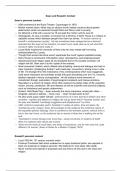Ibsen and Rossetti: Context
Ibsen’s personal context:
ADH premiered at the Royal Theatre, Copenhagen in 1879.
Mother married down, father was an abusive drunk (raised concerns about genetic
determinism which are explored through Rank and Nora), lived in poverty.
He fathered a child with a servant at 16 and paid the mother until he was 30
Ideologically, he was a socialist, a humanist not a feminist, A Doll’s House is a critique of
capitalist society which alienates people from their true selves. "A woman cannot be
herself in contemporary society”. He has sometimes been categorised as a feminist
dramatist but this was not his intention, he wasn't even 'quite clear as to just what this
woman's rights movement really is'.
Laura Kleler inspired the character of Nora only her story ended with her being
institutionalised for 2 years.
Thought that women like Nora would ‘spearhead the revolt’ against capitalist society.
Doll’s House is reminiscent of Euripides’ plays: retrospective, past shaping present
Abandoned formal religion aged 20 and predicted that in the socialist revolution ‘all
religion will fall’, Marx saw it as the ‘opiate of the masses’.
Ibsen pioneered ‘realism’ which utilised natural lighting, drama and dialogue and had no
clear resolution (challenging Scribe’s ‘well-made play’ convention), aiming to be a ‘slice
of life’. He diverged from the melodrama of his contemporaries which was exaggerate,
used stock characters and inevitably ended with good triumphing over evil. It’s ‘romantic
idealism rejected in favour of pragmatism’. He did embrace some elements of
romanticism though: exploration of psychological complexity and intense emotions.
Naturalism is a branch of realism which often explores the darker sides of life: prejudice,
racism, poverty, prostitution, filth and disease as well as scientific and technical subjects
such as inheritance and genetic determinism.
Scribe’s ‘Well Made Play’ – Ibsen subverts the stock characters: aristocratic villain ®
Krogstad, damsel in distress ® Nora, hero ® what Torvald wants to be?
He also wrote a play called ‘Ghosts’: performances of it were banned in Britain and other
countries - syphilis and attacks on religion did not go down well in Victorian society, and
the play was labelled "revoltingly suggestive and blasphemous" by critics
ADH conforms reasonably well to Aristotle’s 3 unities of action, time and place. By
maintaining unity of place, Ibsen demonstrates to the audience the restrictive nature of
the separate spheres ideology. Nora is confined to the domestic sphere, without even a
key to her own home, so the audience has no sense of what she is walking into at the
end.
‘Interested in human beings even more than...social constructs or systems of belief’
(Moi) ‘he explores both nature and nurture’
‘there are two kinds of moral laws, two kinds of conscience, one for men and one, quite
different, for women’ (Ibsen in Notes for a Modern Tragedy 1878)
Rossetti’ personal context:
Lived 1830-94, 19th century romantic writer
Profound Tractarian faith which enabled her to reject traditional paths: she rejected at
least one proposal on religious grounds. She believed in ‘soul sleep’ after death.
Never married and rejected 3 proposals and was free to do this due to her class and
religion.




